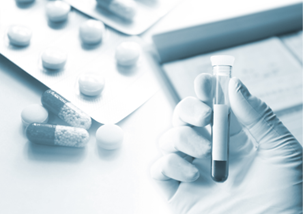Pharmaceutical Safety Test
In drug discovery research, it is necessary to investigate the effects of target active agents on living organisms.
Fujifilm Wako has a lineup of ELISA kits for albumin, a kidney injury marker, glutamate dehydrogenase (GLDH), a liver injury marker, and T cell dependent antibody reaction (TDAR) test.
Product Line-up
More Information
Representative tests in pharmaceutical safety test

In nonclinical studies of pharmaceuticals, safety studies (toxicity studies) are conducted to assess whether the pharmaceutical is safe and which dose and duration of administration are not problematic. Safety studies are as important as pharmacology and pharmacokinetic studies.
Representative nonclinical safety studies include the following:
(Items and contents are those at the time of publication and subject to change.)
Carcinogenicity Study
Carcinogenicity study determines the potential for causing tumors in animals. Assessment is performed in a rodent (mouse or rat) carcinogenicity study. Pituitary endocrine hormones, such as a thyroid stimulating hormone (TSH), are measured to investigate the carcinogenesis mechanism.
Genotoxicity Study
Genotoxicity study is an in vivo and in vitro study to detect substances that cause genetic impairments such as gene mutations, chromosome aberration or recombination, and numerical chromosome abnormalities. It is also considered useful for prediction of carcinogenicity. Assessment of mutagenicity in bacterial reverse mutation assays (Ames test) and in vivo and in vitro genotoxicity assays in mammalian cells are used.
Toxicology Study
Toxicology study determines the dose causing obvious toxic changes, the nature of the changes, and the dose at which no toxicological changes are observed after administration of the test article to mammals. Single and repeated dose toxicity studies are conducted to measure body weight and food intake and perform blood and urine tests. Measurement of blood/urine albumin and blood GLDH is used to assess drug-induced kidney injury (DKI) and drug-induced liver injury (DILI).
Reproductive and Developmental Toxicity Study
Reproductive and developmental toxicity study assesses the influences on mammalian reproduction and development. Abnormalities in maternal function of parent animals and in morphology and function of their offspring are checked.
Immunotoxicity Study
Immunotoxicity study assesses toxicity to the immune system, such as suppression or augmentation of immune responses. Hematology tests, blood biochemistry tests, and histopathological tests are performed. The T cell-dependent antibody response (TDAR) test using T cell-dependent antigens (sheep red blood cells or KLH), which are known to cause robust antibody production, is performed when the impact on antibody production is assessed.
Photo-safety Study
Photo-safety study assesses acute tissue reactions to photoreactive substances produced by light exposure (phototoxicity) and immune-mediated reactions caused by the photoreaction products (photoallergy).
References
- Pharmaceuticals and Medical Devices Agency: https://www.pmda.go.jp/int-activities/int-harmony/ich/0069.html (Dec. 22nd, 2020). (Japanese)
For research use or further manufacturing use only. Not for use in diagnostic procedures.
Product content may differ from the actual image due to minor specification changes etc.
If the revision of product standards and packaging standards has been made, there is a case where the actual product specifications and images are different.
The prices are list prices in Japan.Please contact your local distributor for your retail price in your region.



